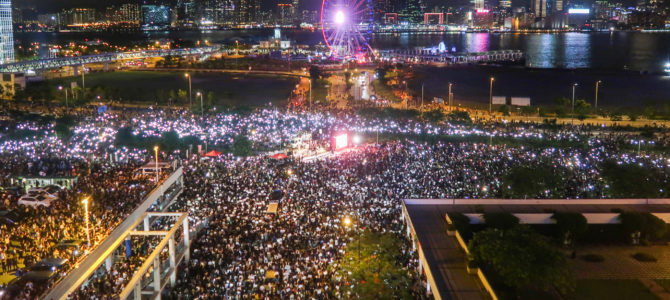
One of the world’s most liberal economies faces one of the toughest threats to the limited self-governance it has left from a parent nation that looms as a global superpower. Demonstrators have taken to the streets for months of protests to revolt against the injustices encroaching on the little autonomy they have, objecting to extradition of the accused to the mainland and demanding greater democratic freedoms by disrupting business-as-usual with grand acts of defiance.
Sound familiar? That’s because it is. The Hong Kong protesters are fighting many of the same injustices that the American colonists fought more than 200 years ago leading up to the American founding.
Since the Hong Kong protests have no leader, the demonstrators throughout the city have no defined list of demands, but all have five goals in common: withdraw the extradition bill that would send accused offenders to mainland China, the resignation of Hong Kong’s Chief Executive Carrie Lam, an investigation into police brutality, the release of those arrested in the protests, and greater democratic freedom.
Hong Kong, similar to the original U.S. colonies, is a semi-self-governing territory that belongs to China but has its own currency, political structure, and cultural identity separate from its parent country. Many who live there see themselves as Hong Kongers rather than Chinese, as those in the colonies saw themselves as citizens of Delaware or Virginia instead of British subjects. Yet China has been increasingly assertive in flexing its rule over Hong Kong, now claiming “complete jurisdiction” of the region.
The protests began in March and came full-bloom in June after a controversial extradition bill was introduced that would have enabled individuals accused of crimes be sent to mainland China for trial. The bill at the center of the protests echoed grievances levied by the American colonists in the 18th century when many of the pre-revolutionary acts required violators to be tried in Great Britain.
Hong Kongers upset by the proposal were concerned that extradition to China would mean unfair trials against the accused, just as the American colonists argued in the 18th century. Critics also argued that the Chinese would use the law to come down on Hong Kong dissidents. The demonstrators scored a major victory just more than a month ago when the territory’s executive officially withdrew the measure.
While extradition of those on trial provoked this year’s protests, it is a movement for democracy that is at the heart of the demonstrations. As were the United States at one point, Hong Kong was a British colony 150 years ago that was turned over to Chinese rule in 1997. Operating under a “one country, two systems” principle, Hong Kong possesses a legal structure largely reflecting its days as a British colony, known as Hong Kong Basic Law. It guarantees citizens important rights not granted to those on the Chinese mainland.
These rights include fundamental American rights enshrined in the Bill of Rights, such as the right to peaceably assemble to petition one’s government, the right to a free press, the right to freely worship, and the freedom of speech. As Beijing strengthens its grip on the Hong Kong people, however, residents are rebelling in fear that these rights are in jeopardy, resulting in a political crisis for the Chinese government not seen in decades.
While Hong Kong maintains democratic freedoms absent in mainland China, the region still lacks the free and fair elections that exist in much of the western world. China always lobbies for a particular candidate who will govern in Beijing’s favor. Lam, Hong Kong’s current executive, won the territory’s top job with the backing of Beijing in 2017 despite running behind the number two candidate John Tsang in the polls. Lam is regarded by many as a puppet of the Chinese government, and protestors have demanded her resignation following the controversy over the extradition bill.
In August, the protesters seized the Hong Kong airport, conducting three days of protests and cancelling flights for at least two. The airport protests drew comparisons by some to the 1773 Boston Tea Party staged in Massachusetts when the colonists in an act of defiance dumped 342 chests of tea into the harbor.
Political analyst Jake Novak, who made the comparison for CNBC, points out that Hong Kong conducts much of Beijing’s accounting, legal, and financial services for China’s state-run and dominantly state-controlled businesses. Therefore the region’s workers see themselves driving the Chinese economy without the political autonomy they have been granted by a treaty China signed with the United Kingdom.
By taking over the airport, Novak argues, “The Hong Kong protestors are essentially saying: ‘no commerce without more autonomy!” “It doesn’t quite have the same ring as, ‘no taxation without representation,’ but the sentiments are very similar,’ Novak writes.
As the trade war between the United States and China rages onward, residents of Hong Kong are paying the price, just as the American colonists saw their economic output used by the British empire to fund costly wars and colonies abroad. The ensuing set-up, while not entirely Beijing’s fault, has added yet more fuel to the resentment many in Hong Kong feel, again mirroring that of the American founding fathers.
Perhaps one of the only differences between the Hong Kong demonstrators and America’s founding fathers is the geographic advantage the U.S. colonies had in going against an over-extended empire an entire ocean away. Hong Kong’s proximity to China offers its people no leverage against Chinese control, and Hong Kong has no real military of its own for self-defense.
While more than 200 years apart, the oppression sparking the Hong Kong protests contains many similarities to the injustices the colonists complained of at the time of the American founding. So as the NBA condemns actions supporting the Hong Kong pro-democracy movement, the basketball league is shaming the history and founding principles of its own country.









